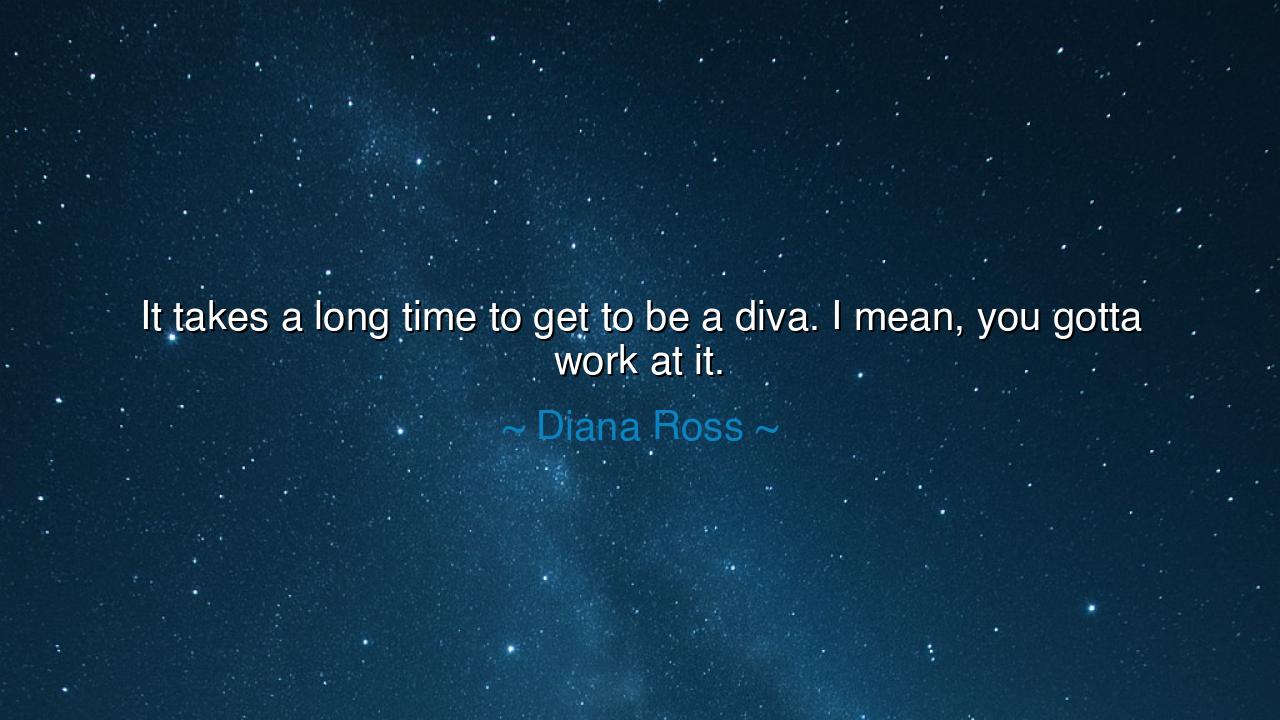
It takes a long time to get to be a diva. I mean, you gotta work






The words of Diana Ross, “It takes a long time to get to be a diva. I mean, you gotta work at it,” shine like a testament to patience, perseverance, and the long journey of mastery. In her voice, we hear not arrogance, but the hard-earned wisdom of one who knows the weight of toil, the sting of sacrifice, and the glory of enduring through years of struggle. For to be called a diva—not in the shallow sense of vanity, but in the deeper sense of one who has reached the heights of artistry and presence—is not a title given overnight, but one forged in sweat, resilience, and unwavering devotion.
At its heart, this teaching speaks to the sacred union of time and effort. Many dream of greatness, but few are willing to carry its cost. A true diva—a master, a leader, a luminary—emerges not from sudden fortune or fleeting talent, but from years of refining one’s craft, of rising after failures, of believing in one’s voice even when the world is deaf to it. Diana Ross, who began her journey in humble Detroit, knew this path intimately. Her rise through The Supremes to becoming one of the most iconic solo performers in history was not magic, but the fruit of tireless work.
The origin of this saying lies in Ross’s own career. From rehearsals that stretched long into the night, to performances that demanded both grace and grit, she built her reputation step by step, note by note. She faced barriers of race, gender, and doubt, yet she never allowed these to silence her. Instead, she turned them into fuel. Her statement is a reminder to all who would chase greatness: do not be fooled by the glitter of the crown—the crown rests only upon those who have labored long to bear its weight.
History gives us other mirrors of this truth. Consider Maria Callas, the great opera singer, whose voice electrified audiences and whose name became synonymous with the word “diva.” Her brilliance was not accident, but the product of relentless practice, discipline, and the willingness to sacrifice comfort for perfection. Or think of Michelangelo, who spent years on his back painting the Sistine Chapel, enduring agony to create beauty eternal. Both remind us that greatness is never instant—it is carved, chiseled, and refined through relentless work.
The deeper wisdom in Ross’s words is that excellence is earned. In a world hungry for shortcuts, for instant fame, her quote reminds us that the path to true mastery cannot be rushed. It is the slow fire that tempers steel, the long pilgrimage that shapes the soul. To become a diva is not simply to be admired, but to embody a legacy of perseverance, artistry, and inner strength.
To the seekers of wisdom, let this be your guide: do not be discouraged if your greatness does not bloom quickly. Do not envy those who seem to rise overnight, for what is gained too swiftly is often lost just as fast. Instead, embrace the long journey. Value the unseen hours of practice, the unnoticed sacrifices, the small victories that shape your character. Remember always that time and work are the architects of greatness.
The practical lesson is this: whatever your craft, your dream, your calling, dedicate yourself fully. Set aside impatience, and commit to the long road. Treat each day as a step toward the summit, and trust that the path itself is shaping you. Practice when you feel weary. Stand tall when you feel overlooked. Know that each effort, each repetition, each act of faith is building the foundation of your future mastery.
Thus, let Diana Ross’s words endure as both encouragement and command: greatness takes time, and you must work at it. Do not fear the long journey, for it is only through that journey that the title of “diva,” or master, or leader, may rightly be yours. For in the end, the crown is not given—it is earned, and it is earned by those who never gave up.






AAdministratorAdministrator
Welcome, honored guests. Please leave a comment, we will respond soon